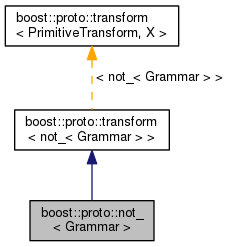Inverts the set of expressions matched by a grammar. More...
#include <proto_fwd.hpp>


Classes | |
| struct | impl |
Public Types | |
| typedef not_ | proto_grammar |
| typedef not_< Grammar > | transform_type |
Public Member Functions | |
| BOOST_PROTO_CALLABLE () typedef X proto_is_transform_ | |
| BOOST_FORCEINLINE boost::proto::detail::apply_transform < transform_type(Expr const &)> ::result_type | operator() (Expr &&e) const |
| BOOST_FORCEINLINE boost::proto::detail::apply_transform < transform_type(Expr const &, State const &)> ::result_type | operator() (Expr &&e, State &&s) const |
| BOOST_FORCEINLINE boost::proto::detail::apply_transform < transform_type(Expr const &, State const &, Data const &)> ::result_type | operator() (Expr &&e, State &&s, Data &&d) const |
Inverts the set of expressions matched by a grammar.
When used as a transform, not_<> returns the current expression unchanged.
If an expression type E does not match a grammar G, then E does match not_<G>. For example, not_<terminal<_> > will match any non-terminal.
| typedef not_ boost::proto::not_< Grammar >::proto_grammar |
|
inherited |
|
inherited |
|
inlineinherited |
|
inlineinherited |
|
inlineinherited |